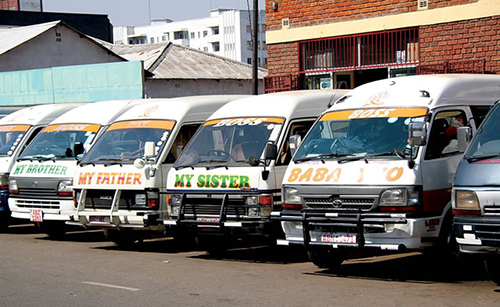


Tendai Makaripe
THE livelihoods of more than half a million people could be affected by the proposed ban of commuter omnibuses in addition to disadvantaging millions others who rely on these vehicles daily for transport, the Financial Gazette can report. Transport and Infrastructural Development Minister, Obert Mpofu (pictured below), recently announced a plan to do away with all commuter omnibuses from the streets by 2016.
Transport and Infrastructural Development Minister, Obert Mpofu (pictured below), recently announced a plan to do away with all commuter omnibuses from the streets by 2016.
According to the minister, modalities are being worked out to assemble a committee to enforce the ban on commuter omnibus imports and this committee will also be responsible for regulating public transport vehicles on the roads until they are phased out.
The country’s urban transport system was at one point run by the State-owned Zimbabwe United Passenger Company (ZUPCO), which changed its name from Harare United Omnibus Company (HUOC).
HUOC was the successor of Salisbury United Omnibus Company (SUOC), which the ZANU-PF government inherited at independence from the colonial regime of Ian Smith.
Before independence, ZUPCO, used to operate a seamless public transport system that was the envy of many.
It used to offer a dependable and affordable form of transport to the commuting public — supporting workers and students as they shuttle to and from their workplaces or schools.
A decade after independence, its fortunes took a turn for the worst, burdened by poor capitalisation, political interference and corruption.
As it became increasingly clear that ZUPCO was failing to discharge its mandate, pressure was brought to bear on government to disband its monopoly.
This resulted in the de-regulation of the urban public transport system.
In came the commuter omnibus operators, that have since turned most urban centres into traffic jungles.
Peeved by the lawlessness brought about by the commuter omnibuses, government is now attempting to restore order in the public transport system.
Few people believe the 2016 deadline is realistic though.
For instance, ZUPCO will not be able to cope with the demand for its services.
The on-going liquidity crunch has also meant that very few independent operators would be in a position to meet the new requirements for urban public transporters.
With elections scheduled for 2018, the ruling ZANU-PF government may also not want to rock the boat by experimenting with anything that might diminish its standing in the eyes of the electorate.
The Greater Harare Association of Commuter Operators said the initiative would also affect many families who have omnibus drivers and conductors as bread-winners.
The rate of unemployment will therefore rise significantly as a result of this phasing out of omnibuses.
“At the moment there are over 60 000 omnibuses in Zimbabwe and each employs two people who have about four dependants each. This means more than 500 000 will be affected,” said the association’s secretary, Ngoni Katsvairo.
Already far too many people in the country are unemployed.
Independent economists say Zimbabwe’s unemployment rate is over 80 percent but the government puts it at 11 percent arguing that most people are employed in the informal sector.
For months, authorities and commuter omnibuses have been engaged in cat and mouse chases which have wreaked havoc in the central business districts, particularly in Harare.
Some of the chases, as authorities have sought to create order in the downtown areas, have proved lethal as innocent bystanders have been run over by commuter taxis running amok with the police in hot pursuit.
According to the new National Transport Policy, the design of most roads in urban areas do not conform to the rapid increase in traffic volumes hence government wants to introduce high volume buses to decongest urban centres and Moyo called on public transport operators to start investing in bigger buses and those without capacity can merge with other operators.
Investigations by the Financial Gazette revealed that the idea of decongesting the city and working towards achieving a more sustainable transport system is welcome but banning omnibuses is not the ideal solution.
Zimbabwe Passengers Association secretary-general, Paul Makiwa, said the omnibuses that the minister wants to phase out are actually doing a splendid job plying routes that are shunned by many buses.
“These kombis are the ones that are operating in the rural areas. We have places that have gone 20 years without buses plying there. Many bus operators are not willing to go to those areas because of a poor road network,” said Makiwa.
Makiwa urged the minister to devote much of his time on finding ways to improve the state of the roads which are marred by potholes thus contributing to accidents and unnecessary loss of life.
“He should address the problem of the road network first before he starts phasing out the kombis.
“If he addresses the challenges of poor roads, it would result in more buses coming and the kombis would phase themselves out,” he said.